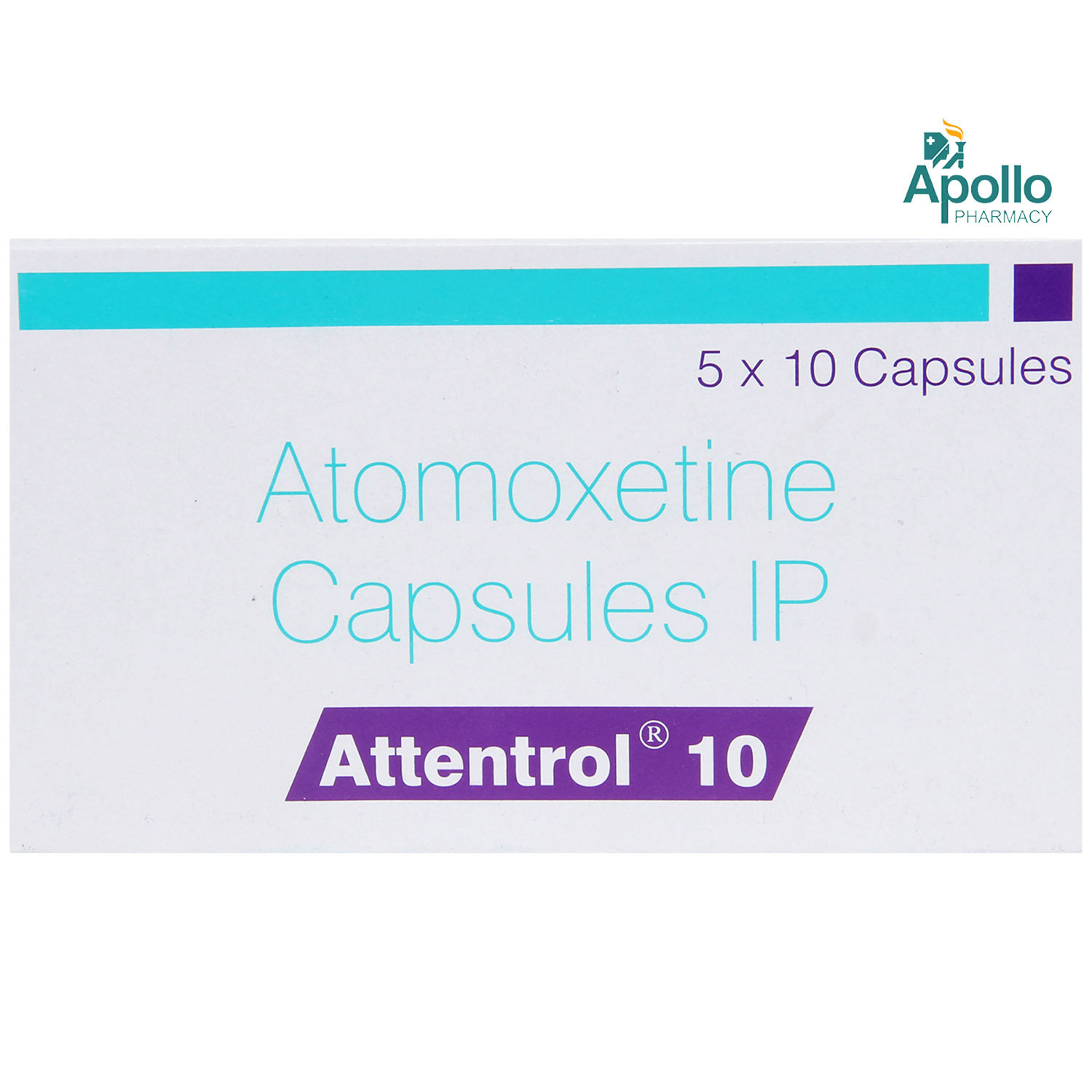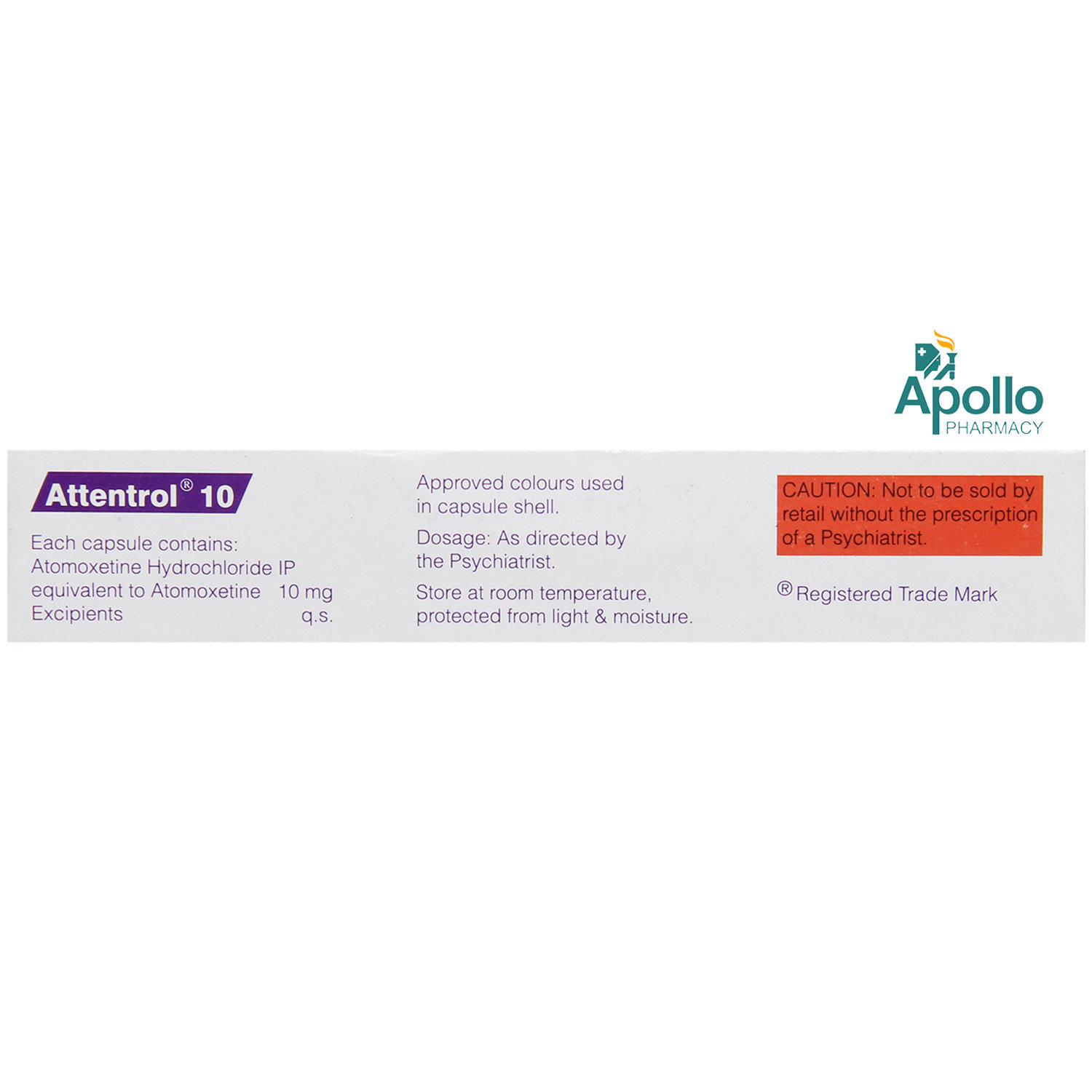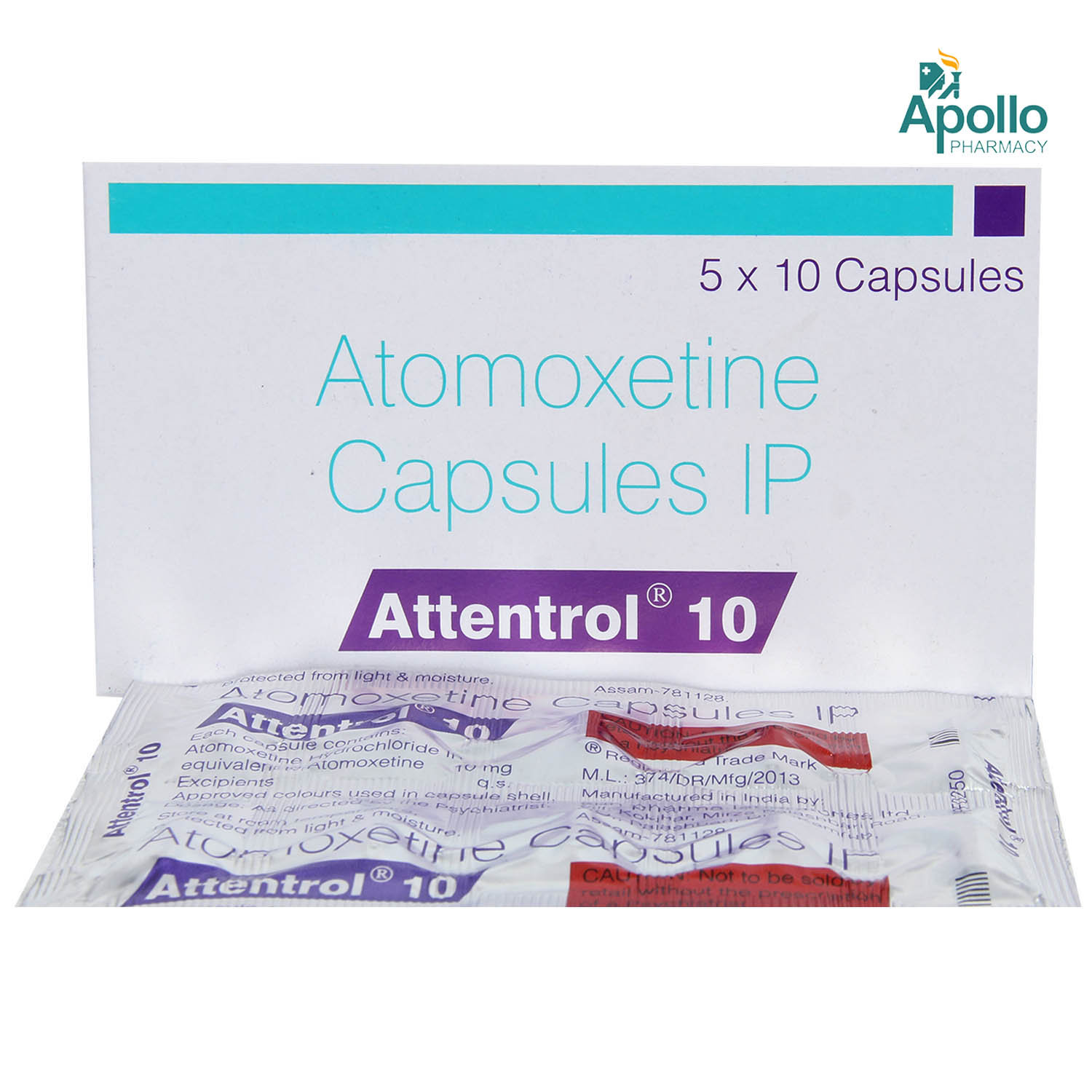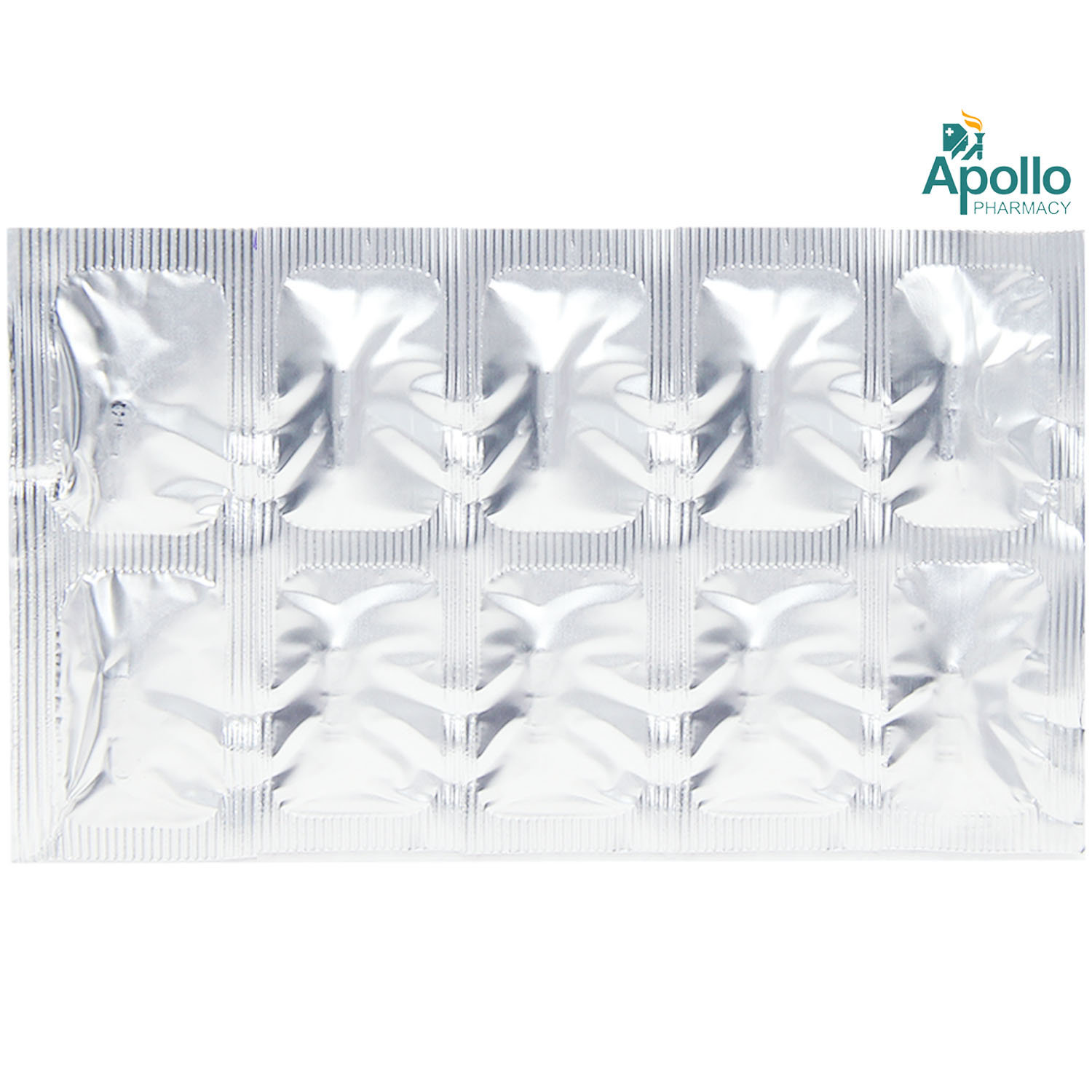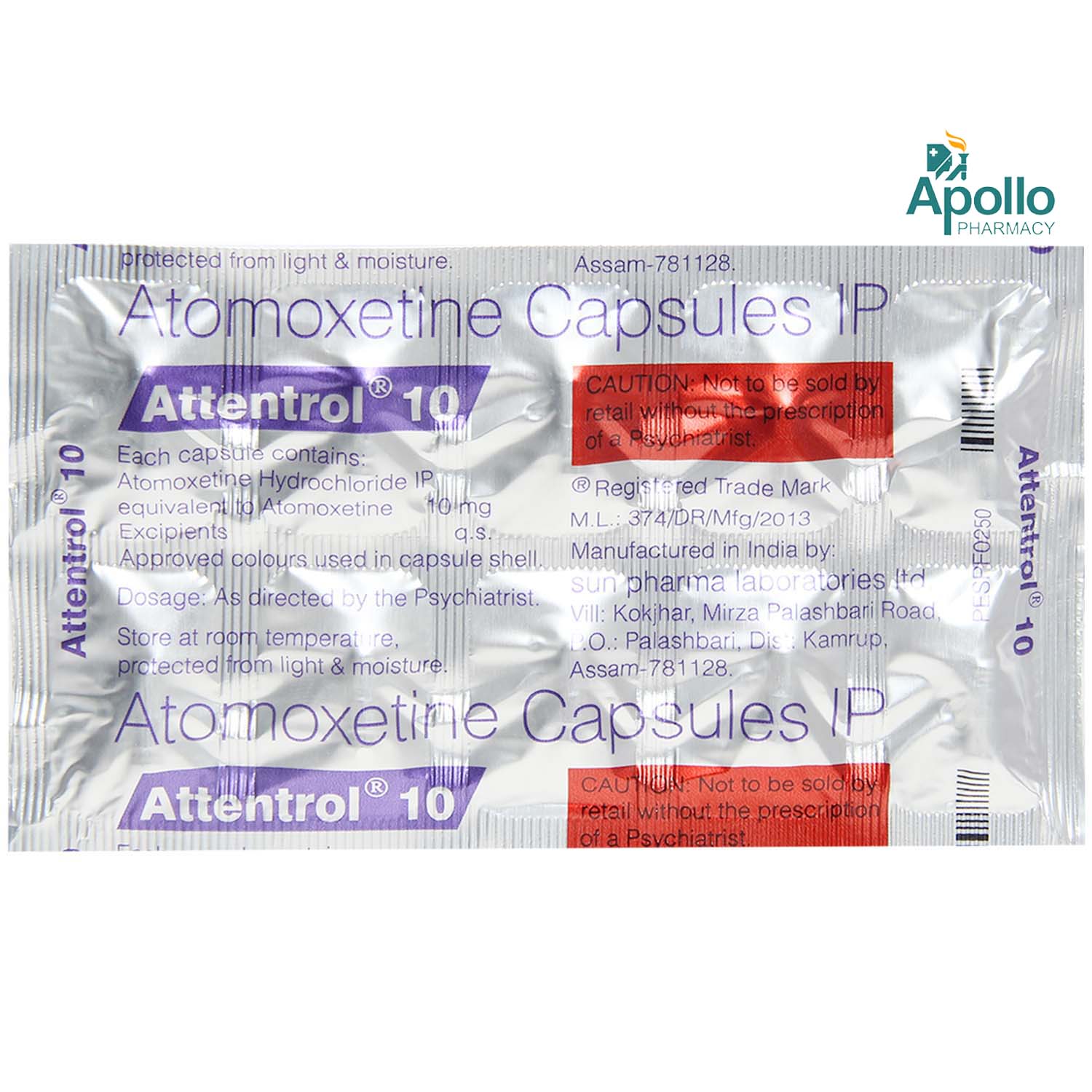Attentrol 10 Capsule 10's
MRP ₹107.5
(Inclusive of all Taxes)
₹16.1 Cashback (15%)
Provide Delivery Location
Online payment accepted
 Prescription drug
Prescription drugWhats That
Composition :
Manufacturer/Marketer :
Consume Type :
Expires on or after :
Return Policy :
About Attentrol 10 Capsule
Attentrol 10 Capsule belongs to a group of drugs known as selective norepinephrine reuptake inhibitors. Attentrol 10 Capsule is antidepressant which is used to treat attention deficit hyperactivity disorder (ADHD). Attention-deficit hyperactivity disorder (ADHD) is one of the most common mental disorders that affect children. ADHD also affects many adults. Symptoms of ADHD include hyperactivity (excess movement that is not fitting to the setting), inattention (not being able to keep focus), and impulsivity (hasty acts that occur at the moment without thought). It is seen thrice as commonly in boys as in girls. The main cause of the disease is unknown but some factors include genetics, food activities, environmental factors, cigarette smoking, and alcohol abuse during pregnancy.
Attentrol 10 Capsule contains ‘Atomoxetine’ which moderates the activity of a few chemical messengers in the brain, which decreases restlessness and increases attention. It is a medicine used for depression.
Take Attentrol 10 Capsule as prescribed. You are advised to take Attentrol 10 Capsule for as long as your doctor has prescribed it for you depending on your medical condition. You may experience certain common side effects such as headache, vomiting, nausea, abdominal pain, decreased appetite, sleepiness, increased heart rate, and high blood pressure. Most of these side effects do not require medical attention and will resolve gradually over time. However, you are advised to talk to your doctor if you experience these side effects persistently.
Before taking Attentrol 10 Capsule inform your doctor if you have any allergy, heart disease, high blood pressure, glaucoma, or pheochromocytoma. If you are taking another antidepressant for the last 14 days, then inform your doctor. Do not stop, start, or change the dose of any drug without informing your doctor. This Attentrol 10 Capsule may disturb growth in children and teens in several cases. They may need regular check-ups for growth. Use with care in children and inform your doctor. Inform your doctor before taking Attentrol 10 Capsule if you are pregnant or planning for pregnancy as it may cause risk to the baby. If you are breastfeeding mother immediately contact your doctor.
Uses of Attentrol 10 Capsule
Directions for Use
Key Benefits
Attentrol 10 Capsule belongs to a group of drugs known as selective norepinephrine reuptake inhibitors. Attentrol 10 Capsule is antidepressant which is used to treat attention deficit hyperactivity disorder (ADHD). Attentrol 10 Capsule contains ‘Atomoxetine’ which moderates the activity of few chemical messengers in the brain, which decreases restlessness and increases attention. It is a medicine used in depression.
Storage
- Inform your doctor about the nausea and discuss possible alternatives to the medication or adjustments to the dosage.
- Divide your daily food intake into smaller, more frequent meals to reduce nausea.
- Opt for bland, easily digestible foods like crackers, toast, plain rice, bananas, and applesauce.
- Avoid certain foods that can trigger nausea, such as fatty, greasy, spicy, and smelly foods.
- Drink plenty of fluids, such as water, clear broth, or electrolyte-rich beverages like coconut water or sports drinks.
- Use ginger (tea, ale, or candies) to help relieve nausea.
- Get adequate rest and also avoid strenuous activities that can worsen nausea.
- Talk to your doctor about taking anti-nausea medication if your nausea is severe.
- Record when your nausea occurs, what triggers it, and what provides relief to help you identify patterns and manage your symptoms more effectively.
- Preventing Vomiting (Before it Happens)
- Take medication exactly as prescribed by your doctor. This can help minimize side effects, including vomiting.
- Having a small meal before taking your medication can help reduce nausea and vomiting.
- Talk to your doctor about taking anti-nausea medication along with your prescribed medication.
- Managing Vomiting (If it Happens)
- Try taking ginger in the form of tea, ale, or candy to help alleviate nausea and vomiting.
- What to Do if Vomiting Persists
- Consult your doctor if vomiting continues or worsens, consult the doctor for guidance on adjusting your medication or additional treatment.
- Rest well; get enough sleep.
- Eat a balanced diet and drink enough water.
- Manage stress with yoga and meditation.
- Limit alcohol and caffeine.
- Physical activities like walking or jogging might help boost energy and make you feel less tired.
- Consume more protein-rich foods and healthy fats like beans, avocados, cheese, nuts and lean meats to minimize appetite.
- Prefer foods high in fiber to help feel full for a long time.
- If you have decreased appetite, eat only when you are hungry.
- Eat several small meals or snacks all day.
- Try to take only small sips of fluids while eating.
- Drink water or other clear fluids.
- To prevent worsening of pain, limit intake of tea, coffee, or alcohol.
- Include bland foods like rice, toast, crackers, and rice in your diet.
- Avoid lying down immediately after eating as it may cause indigestion or heartburn.
- Avoid acidic and spicy food as it may cause indigestion.
- Avoid driving or operating machinery or activities that require high focus until you know how the medication affects you.
- Maintain a fixed sleeping schedule, create a relaxing bedtime routine and ensure your sleeping space is comfortable to maximize your sleep quality.
- Limit alcohol and caffeine as these may worsen drowsiness and disturb sleep patterns.
- Drink plenty of water as it helps with alertness and keeps you hydrated and for overall well-being.
- Moderate physical activity can improve energy levels, but avoid intense workouts right before bedtime.
- Inform your doctor about your constipation symptoms. They may adjust your medication or advise alternative treatments.
- Stay hydrated by drinking sufficient of water (at least 8-10 glasses a day) to help soften stool and promote bowel movements.
- Increase fibre intake by eating foods high in fibre, such as fruits, whole grains, vegetables and legumes, to help bulk up the stool.
- Establish a bowel routine by trying to go to the bathroom at the same time each day to train your bowels.
- Engaging in regular exercise, like walking or yoga, can support in bowel movement stimulation.
- Consult your doctor if constipation persists, and discuss alternative treatments or adjustments to your medication.
Drug Warnings
Before taking Attentrol 10 Capsule inform your doctor if you have any allergy, heart disease, high blood pressure, glaucoma, or pheochromocytoma. If you are taking another antidepressant in the last 14 days, then inform your doctor. Do not stop, start, or change the dose of any drug without informing your doctor. This Attentrol 10 Capsule may disturb growth in children and teens in several cases. They may need regular check-ups for growth. Use with care in children and inform your doctor. Attentrol 10 Capsule increased the risk of suicidal thoughts or actions in children and teens. All people who take Attentrol 10 Capsule need to be watched closely. Inform the doctor right away if signs like panic attacks, nervousness, depression, irritability, restlessness, or mood changes are new or worse. Inform the doctor immediately if any thoughts or actions of suicide occur. Inform your doctor before taking Attentrol 10 Capsule if you are pregnant or planning for pregnancy as it may cause risk to the baby. If you are a breastfeeding mother immediately contact your doctor.
Drug-Drug Interactions
Drug-Drug Interactions
Login/Sign Up
Taking tranylcypromine with Attentrol 10 Capsule can cause severe high blood pressure.
How to manage the interaction:
Taking Attentrol 10 Capsule with Tranylcypromine is not recommended, but it can be taken if a doctor has advised it. However, if you experience severe headache, blurred vision, confusion, seizures, chest pain, nausea or vomiting, sudden numbness or weakness (especially on one side of the body), speech difficulties, fever, sweating, lightheadedness, and fainting contact a doctor immediately. Do not discontinue any medications without consulting a doctor.
Using mesoridazine together with Attentrol 10 Capsule can increase the risk of an irregular heart rhythm.
How to manage the interaction:
Taking Attentrol 10 Capsule with Mesoridazine is not recommended, consult a doctor before taking it. You should seek immediate medical attention if you develop sudden dizziness, lightheadedness, fainting, shortness of breath, or heart palpitations. Do not stop using any medications without talking to a doctor.
Using methylene blue together with Attentrol 10 Capsule can cause high blood pressure.
How to manage the interaction:
Taking Attentrol 10 Capsule with Methylene blue is not recommended, consult a doctor before taking it. You should seek immediate medical attention if you experience sudden and severe headache, blurred vision, confusion, seizures, chest pain, nausea or vomiting, sudden numbness or weakness (especially on one side of the body), speech difficulties, fever, sweating, lightheadedness, and/or fainting. Do not stop using any medications without talking to a doctor.
Using furazolidone together with Attentrol 10 Capsule can cause serious high blood pressure.
How to manage the interaction:
Taking Attentrol 10 Capsule with Furazolidone is not recommended, consult a doctor before taking it. You should seek immediate medical attention if you experience sudden and severe headache, blurred vision, confusion, seizures, chest pain, nausea or vomiting, sudden numbness or weakness (especially on one side of the body), speech difficulties, fever, sweating, lightheadedness, and fainting. Do not stop using any medications without talking to a doctor.
Using thioridazine together with Attentrol 10 Capsule can increase the risk of an irregular heart rhythm.
How to manage the interaction:
Taking Attentrol 10 Capsule with Thioridazine is not recommended, consult a doctor before taking it. You should seek immediate medical attention if you develop sudden dizziness, lightheadedness, fainting, shortness of breath, or heart palpitations. Do not stop using any medications without talking to a doctor.
Taking Attentrol 10 Capsule and Grepafloxacin may increase the risk of irregular heart rhythm.
How to manage the interaction:
Taking Attentrol 10 Capsule with Grepafloxacin is not recommended, consult a doctor before taking it. Do not discontinue any medication without consulting a doctor.
Using dronedarone together with Attentrol 10 Capsule can increase the risk of an irregular heart rhythm.
How to manage the interaction:
Taking Attentrol 10 Capsule with Dronedarone is not recommended, please consult a doctor before taking it. You should seek immediate medical attention if you develop sudden dizziness, lightheadedness, fainting, shortness of breath, or heart palpitations. Do not stop using any medications without talking to a doctor.
Using procarbazine together with Attentrol 10 Capsule can cause dangerously high blood pressure.
How to manage the interaction:
Taking Procarbazine with Attentrol 10 Capsule is not recommended, consult a doctor before taking it. You should seek immediate medical attention if you experience sudden and severe headache, blurred vision, confusion, seizures, chest pain, nausea or vomiting, sudden numbness or weakness (especially on one side of the body), speech difficulties, fever, sweating, lightheadedness, and/or fainting. Do not stop using any medications without talking to a doctor.
Taking Attentrol 10 Capsule and Pimozide the metabolism of Attentrol 10 Capsule can be decreased.
How to manage the interaction:
Taking Attentrol 10 Capsule with Pimozide is not recommended, consult a doctor before taking it. Do not discontinue any medication without consulting a doctor.
Using saquinavir together with Attentrol 10 Capsule can increase the risk of an irregular heart rhythm.
How to manage the interaction:
Taking Attentrol 10 Capsule with Saquinavir is not recommended, please consult a doctor before taking it. You should seek immediate medical attention if you develop sudden dizziness, lightheadedness, fainting, shortness of breath, or heart palpitations. Do not stop using any medications without talking to a doctor.
Drug-Food Interactions
Drug-Food Interactions
Login/Sign Up
Diet & Lifestyle Advise
- Eat a well-balanced diet.
- Avoid processed or packed foods and foods that are high in refined sugars.
- Exercise regularly.
- Lose excess weight and keep a check on your weight.
- Avoid stress.
- Improve your mood by being active, socializing with others, and talking about your feelings.
- Quit alcohol intake and smoking.
Side Effects of Attentrol 10 Capsule
- Headache
- Vomiting
- Nausea
- Abdominal pain
- Decreased appetite
- Sleepiness
- Increased heart rate
- High blood pressure
Habit Forming
Therapeutic Class
All Substitutes & Brand Comparisons
RX
Out of StockDefexit-10 Capsule 10's
East West Pharma India Pvt Ltd
₹74.3
(₹6.69 per unit)
30% CHEAPER
Drug-Diseases Interactions
Drug-Diseases Interactions
Login/Sign Up
FAQs
Drug-Drug Interactions Checker List
- ISOCARBOXAZID
- FLUOXETINE
- BUPROPION
- LINEZOLID
- ASPIRIN
Special Advise
- Inform your doctor if you feel unusual changes in mood or suicidal thoughts.
- Do not stop taking Attentrol 10 Capsule without talking to your doctor first.
- Your doctor will monitor your heart rate and blood pressure regularly while taking the medicine.
Disease/Condition Glossary
Attention deficit hyperactivity disorder (ADHD): It is one of the most common mental disorders that affect children. ADHD also affects many adults. Symptoms of ADHD include hyperactivity (excess movement that is not fitting to the setting), inattention (not being able to keep focus), and impulsivity (hasty acts that occur at the moment without thought). An estimated 2.5 percent of adults and 8.4 percent of children have ADHD. It is seen thrice as commonly in boys as in girls. The main cause of the disease is unknown but some factors include genetics, food activities, environmental factors, cigarette smoking, and alcohol abuse during pregnancy.

Have a query?
Alcohol
Safe if prescribed
Do not drink alcohol with this Attentrol 10 Capsule because it may produce more dizziness and drowsiness.
Pregnancy
Consult your doctor
This Attentrol 10 Capsule should be used only when clearly needed. Discuss the risks and benefits with your doctor.
Breast Feeding
Consult your doctor
It is not known if this drug passes into breast milk. Inform your doctor before breast-feeding.
Driving
Safe if prescribed
If you experience drowsiness, dizziness, or a headache as side-effects when using Attentrol 10 Capsule then it may not be safe to drive or operate heavy machinery.
Liver
Consult your doctor
Dose adjustment may be needed in patients with liver disease. Please consult your doctor if you have liver disease or any concerns regarding this.
Kidney
Consult your doctor
Dose adjustment may be needed in patients with kidney impairment. Please consult your doctor if you have kidney impairment or any concerns regarding this.
Children
Safe if prescribed
Attentrol 10 Capsule can be given to children if prescribed by the doctor.

